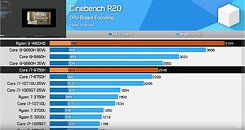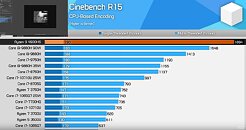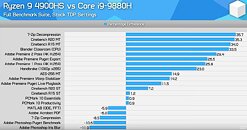Monday, March 30th 2020

AMD Ryzen 9 4900HS Torpedoes Intel's Core i9 Mobile Lineup, Fastest Mobile Processor
Reviews of AMD's flagship mobile processor, the Ryzen 9 4900HS went live today, and the verdict is clear. Intel has lost both performance and battery-efficiency leadership over its most lucrative computing segment: mobile client computing. In a Hardware Unboxed review comparing the 4900H to Intel's current Core i9 flagship, the i9-9880H, the AMD chip at its stock 45 W TDP beats the Intel one even with the Intel chip configured to 90 W cTDP.
The 4900HS posts 11.9% higher CineBench R20 score (both chips are 8-core/16-thread) when the Intel chip is bolstered with 90 W cTDP, and a whopping 33% faster when the i9-9980H is at its stock settings, and 54% faster when its capped at 35 W cTDP. It also ends up over 150% faster than AMD's last fastest mobile processor, the 12 nm "Picasso" based Ryzen 7 3750H. The story repeats with CineBench R15 (4900H being 34% faster than stock i9-9880H), 18% faster at Handbrake HEVC, 25% faster at Blender "Classroom," and 35% faster at 7-Zip benchmark. The AMD chip lags behind by 12% in the less-parallelized Photoshop. On creativity apps that do scale with cores, such as Premiere "Warp Stabilizer 4K," the 4900HS is 12.6% faster. Gaming performance remains an even split between the two chips. Find several more interesting test results and commentary in the Hardware Unboxed presentation here. Intel has already announced a response to the 4900HS in the form of the i9-10980HK.
The 4900HS posts 11.9% higher CineBench R20 score (both chips are 8-core/16-thread) when the Intel chip is bolstered with 90 W cTDP, and a whopping 33% faster when the i9-9980H is at its stock settings, and 54% faster when its capped at 35 W cTDP. It also ends up over 150% faster than AMD's last fastest mobile processor, the 12 nm "Picasso" based Ryzen 7 3750H. The story repeats with CineBench R15 (4900H being 34% faster than stock i9-9880H), 18% faster at Handbrake HEVC, 25% faster at Blender "Classroom," and 35% faster at 7-Zip benchmark. The AMD chip lags behind by 12% in the less-parallelized Photoshop. On creativity apps that do scale with cores, such as Premiere "Warp Stabilizer 4K," the 4900HS is 12.6% faster. Gaming performance remains an even split between the two chips. Find several more interesting test results and commentary in the Hardware Unboxed presentation here. Intel has already announced a response to the 4900HS in the form of the i9-10980HK.




211 Comments on AMD Ryzen 9 4900HS Torpedoes Intel's Core i9 Mobile Lineup, Fastest Mobile Processor
Edit: typo :(
And yes, I know laptops are not the easiest thing to test because you cannot play with hardware configuration.
Civilization VI is a bit of a weird one when it comes to benchmarks. Its FPS used to be a pretty bad benchmark, turn times were better. I do think it was fixed at one point. I cannot find a larger or more current sample of Civilization VI results. Anandtech's Bench is using 1080p Ultra on GTX1080: www.anandtech.com/bench/CPU-2019/2400I did not say a thing about Intel or Nvidia. Pretty sure that 1650 Max-Q is an Intel+Nvidia system but that is besides the point. I am certain that the same results would happen with say 3750H and RX5500 mobile and my comment would have remained the same.
@ARF A suggestion: instead of leaving angry :mad: reactions to our posts, maybe try arguing for your opinion? Getting angry at someone arguing against you isn't particularly compelling, and won't change anyone's mind. I would also suggest to stop the straw man arguments - neither of us ever expressed anything even remotely resembling a desire to benchmark anything "follow[ing] guidelines by Intel and Nvidia". Arguing like that is disingenuous; best case scenario it's a serious misunderstanding of what we said, worst case it's a deliberate attempt at making someone who disagrees with you look bad by painting us as biased. Either way, it only serves to make you look bad for doing it. Presenting arguments to back up your opinion is much better.
Whether it's premium flagship gaming laptops like the Razer Blade or the cheaper chunky plastic models where there isn't much profit - pricing is aggressive and margins are slim - gaming laptops and laptops with high-end processors are not even close to being as mainstream as your typical 15W ultrabook equivalent. For every one flagship gaming laptop sold with a 35-45W processor, there will be another 15 or so flagship 'ultrabooks' sold without a GPU, and with a 15W processor. Think Dell XPS, HP Spectre, Surface Pro, Blade Stealth etc.Absolutely not! As long as the GPU isn't robbed of its power budget like it is with the Ryzen 2000U and 3000U series, then there are no downsides and it's a win-win :)
IMO mobile processors with integrated graphics are still too focused on CPU performance when it's graphics that usually limits them the most. Take the old 2700U - it's pretty mediocre as a CPU with it's four cores and 2.2GHz clock. Nonetheless, for the vast majority of people it's fast enough that they won't ever notice the CPU being a bottleneck in day-to-day use. Web browsing, office productivity, media playback, moving files around - the old and slow 2700U is fast enough (even when clamped down to 13W) that nobody is going to care what processor is actually in the laptop. Even media transcoding is something that most people have the cloud do for them now, rather doing it on their own CPU.
These 8C/16T processors will be great for video editors, 3D modellers, architects, engineers, and designers doing renders, and data analysts working on vast datasets. I'm not denying they'll love these new 35-45W Zen2 processors - but they are also not going to care about the IGP until they need to do a GPU-assisted task, in which case the IGP is too weak to be of use, so they'll definitely be buying something with a dGPU instead if they even have to work on a laptop instead of a desktop. The visualisation department at my firm refuses to do anything other than presentations on laptops. Even ignoring the huge performance gulf between a proper workstation and a laptop, they simply need more screen real estate, better connectivity, and more storage than a laptop can reasonably provide. That's why high-performance laptops are a small niche in the sales figures, and therefore why these HS and H APUs are not anywhere near as important to the market as the U-series which is where 95% of the money and marketshare is. As for the data analysts, I work with some of those and they use their Surface Pro to connect to their dataset on a remote server, via a web app. All the heavy lifting is done at a datacenter because that's how industry has moved on in the last few years.
I am sure they will be more readily available in the coming months.